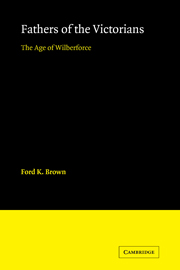Book contents
- Frontmatter
- Contents
- Dedication
- Foreword
- PART I WAR ON THE GENTILE WORLD
- 1 Fat Bulls of Bashan
- 2 The Moses of the Israelites, a Courtier of Pharaoh
- 3 Disciples in Caesar's Household
- 4 Citizenship in Heaven
- 5 Sennacherib's Army: The Rally round the Alter
- PART II LABOURING FOR THE SPIRITUAL IMPROVEMENT OF OTHERS
- PART III ENGLAND IN DANGER
- Bibliography
- Index
- Frontmatter
- Contents
- Dedication
- Foreword
- PART I WAR ON THE GENTILE WORLD
- 1 Fat Bulls of Bashan
- 2 The Moses of the Israelites, a Courtier of Pharaoh
- 3 Disciples in Caesar's Household
- 4 Citizenship in Heaven
- 5 Sennacherib's Army: The Rally round the Alter
- PART II LABOURING FOR THE SPIRITUAL IMPROVEMENT OF OTHERS
- PART III ENGLAND IN DANGER
- Bibliography
- Index
Summary
The Evangelicals were not alone in seeing flagrant and dangerous evil about them in the Age of Elegance. There were pastimes and diversions, even some conspicuously of the world and the flesh, that High Churchmen had little or no objection to. All violations of the Sabbath—newspapers, travel and the transacting of any business, but especially amusements such as cards, balls, assemblies or Sunday music, even walks in the country—seemed shockingly unchristian to the Evangelicals. On any day, the theatre, opera and masquerade, village fairs and rural sports, country dances, fiddlers and mountebanks, horse races, boat races, prize fights, ‘low’ gambling, the fives court and the public house, bearbaiting and bull-baiting, jolly songs, immodest feminine dress, jewellery and other adornment, French fashions (or anything French), improper literature (Shakespeare, Cervantes, Byron) and proper but unreligious literature (Walter Scott), with other things that will appear in the following pages, were abhorrent to the truly religious character and generally not condemned by High Church. But there were other evils opposed by all thoughtful persons. In its mere nominal Christian way the Anti-Jacobin Review and Magazine, for example, a High Church journal that was the most violent enemy of ‘the Fanatics’ for some years of the reform period, had moral standards as stern as the Evangelicals'. It was opposed to useless violations of the Sabbath, to the introduction of corrupt French manners and to some kinds of dancing.
- Type
- Chapter
- Information
- Fathers of the VictoriansThe Age of Wilberforce, pp. 15 - 44Publisher: Cambridge University PressPrint publication year: 1961



